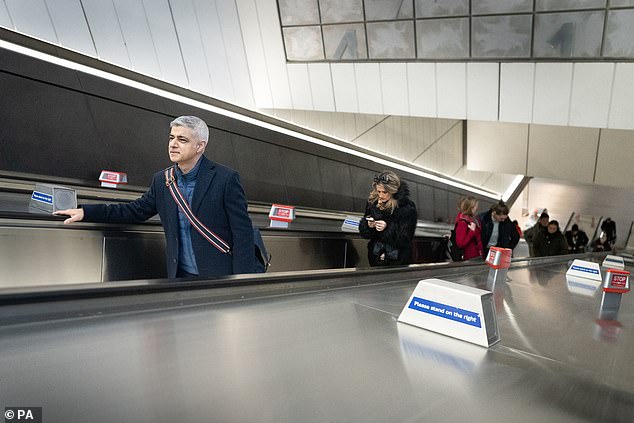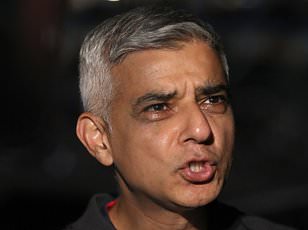Sadiq Khan demands £500million a year from Keir Starmer's new Labour government as he bids to double his budget for London's transport network
Sadiq Khan is demanding more than £500million a year from Sir Keir Starmer's new Labour government as he bids to double his budget for London's transport network.
Transport for London (TfL), which reports to the Mayor of London, said a long-term funding deal would stop the need to hold funding negotiations each year and would make it more efficient to purchase major expenses such as new trains.
The local government body is seeking double the £250million it was granted under the Conservatives for 2024/25, which was half the amount requested.
It marks a fresh test for new Chancellor Rachel Reeves to control government spending amid requests from her own party. London already receives three times more transport funding per head than the North.
The Department for Transport said it is critical for London's transport network to flourish for both the local and national economies.

Sadiq Khan is demanding more than £500million a year from Sir Keir Starmer's new Labour government

Ahead of the general election, Transport Secretary Louise Haigh (pictured) backed plans for a long-term strategy on the procurement of rolling stock
A spokesman told the Telegraph: 'We're working with the mayor on funding plans for transport in the capital, providing value for money and lasting benefits for the public.'
Ahead of the general election, Transport Secretary Louise Haigh backed plans for a long-term strategy on the procurement of rolling stock. But Labour has also resisted Mr Khan's demands to take control of suburban rail lines in London.
Mr Khan, who was re-elected to a third term for Labour in May, wanted to 'create a metro-style network that delivers genuine benefits to Londoners'.
TfL currently gets around 75 per cent of its capital requirements via borrowings, outside investment and project-based grants. A further 25 per cent comes from central government.
TfL said it had to renegotiate payments for 94 Piccadilly line trains with manufacturer Siemens because the funding this year was about half the amount sought.
The push for extra funding for the Tube, Docklands Light Railway, London Overground and Croydon trams comes after TfL made a profit last year for the first time since the pandemic.
TfL finance chief Rachel McLean said this money would be reinvested but still leaves them unable to fund vital infrastructure.
She said: 'Whilst we are now able to cover our day-to-day costs, with any surplus going directly into infrastructure improvements, we cannot fund major capital projects entirely from our own resources, just like other transport authorities.

TfL, which reports to Mr Khan, is seeking double the £250million it was granted under the Conservatives for 2024/25
'With a long-term funding deal, TfL would be able to deliver a programme of sustainable investment, aligning our national supply chains around long-term programmes and offering better outcomes for a lower cost.'
She insisted that TfL spending is not a handout to London and that long-term funding would support jobs and economy across the whole country.
Siemens is spending £200million on a Yorkshire factory to build the Piccadilly line trains.
The long-term funding would also support replacing Bakerloo line services, 54 new DLR trains and to replace a south London fleet of trams which has been in service for almost 25 years.
Last year, TfL said it invested £6.5billion with more than 2,000 suppliers of which two thirds were outside of London.
The local government body says a long-term deal would bring it into line with Network Rail and National Highways - both of whom have five-year funding deals with the Department for Transport.



























































































































































































































































































































